#and (by association) dr halsey is also jacked
Explore tagged Tumblr posts
Text

halo au where everythings the same but cortana is buff as hell
#and (by association) dr halsey is also jacked#first fandom-related art of the year#my art#fanart#digital art#sketch#halo game#cortana#i do not like drawing her from behind lol
1K notes
·
View notes
Text
THE BIG STREET
August 13, 1942
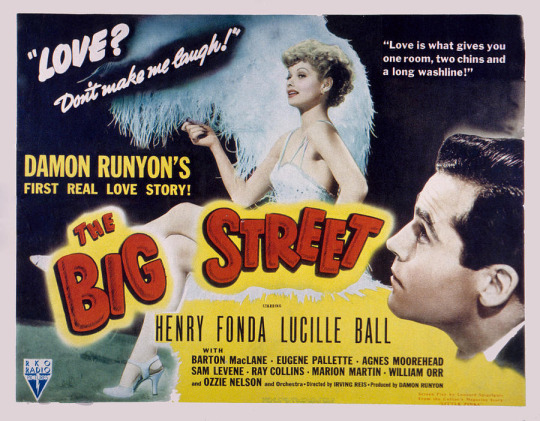
Producer: Damon Runyon
Director: Irving Reis
Screenplay: Leonard Spigelgass, based on the short story “Little Pinks” by Damon Runyon, first published in Collier’s magazine.
Dance Staging: Chester Hale
Gowns: Renie
Miss Ball’s Dancing Costume: Freddy Wittop
Miss Ball’s Make-Up: Perc Westmore
The film is sometimes referred to as Damon Runyon’s The Big Street.
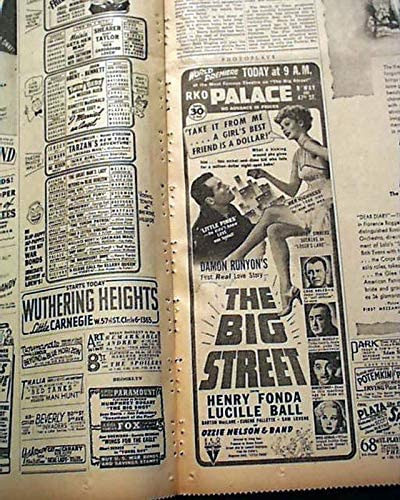
The film premiered in New York City at the RKO Palace on August 13, 1942. That same day Disney’s long-awaited Bambi opened at Radio City Music Hall. At the Capitol, Orson Welles’ The Magnificent Ambersons, also starring Agnes Moorehead and Gil Perkins, continued its run. Nearby, at the Albee, a second-run cinema, Top Hat (1935) starring Ginger Rogers and Lucille Ball was playing. The Big Street opened nationally September 4, 1942.
“Love is something that gets you one room, two chins, and three kids.” ~ Gloria Lyons (Lucille Ball)
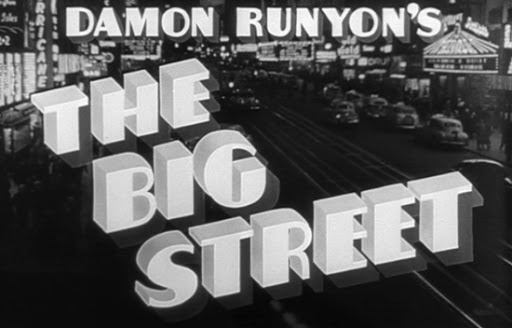
PRINCIPAL CAST
Lucille Ball (Gloria Lyons aka ‘Her Highness’) was born on August 6, 1911 in Jamestown, New York. She began her screen career in 1933 and was known in Hollywood as ‘Queen of the B’s’ due to her many appearances in ‘B’ movies. With Richard Denning, she starred in a radio program titled “My Favorite Husband” which eventually led to the creation of “I Love Lucy,” a television situation comedy in which she co-starred with her real-life husband, Latin bandleader Desi Arnaz. The program was phenomenally successful, allowing the couple to purchase what was once RKO Studios, re-naming it Desilu. When the show ended in 1960 (in an hour-long format known as “The Lucy-Desi Comedy Hour”) so did Lucy and Desi’s marriage. In 1962, hoping to keep Desilu financially solvent, Lucy returned to the sitcom format with “The Lucy Show,” which lasted six seasons. She followed that with a similar sitcom “Here’s Lucy” co-starring with her real-life children, Lucie and Desi Jr., as well as Gale Gordon, who had joined the cast of “The Lucy Show” during season two. Before her death in 1989, Lucy made one more attempt at a sitcom with “Life With Lucy,” also with Gordon.
Gloria’s singing voice was provided by Martha Mears, who also did Ball’s singing in DuBarry Was a Lady (1944).
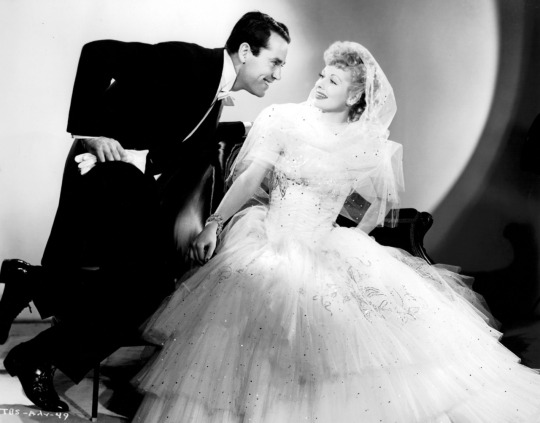
Henry Fonda (Augustus Pinkerton II aka ‘Little Pinks’) first worked with Lucille Ball in the 1935 film I Dream Too Much. When Lucille Ball first got to Hollywood, the two actually briefly dated. They collaborated on the TV special “The Good Years” (1962) and the film Yours, Mine and Ours (1968). During the 1970s, Fonda and Ball often turned up on the same awards and tribute shows. Fonda was nominated for three Oscars, winning in 1982 for On Golden Pond. He also won an honorary Oscar in 1981. Fonda died in 1982 at age 77.
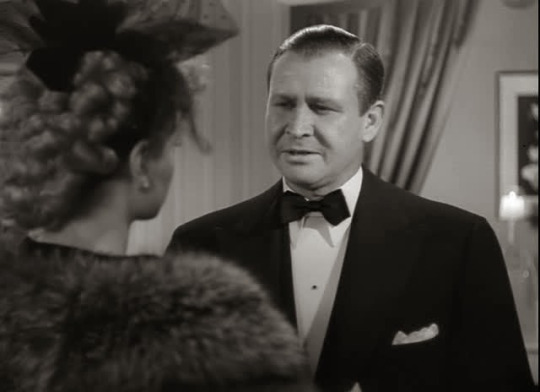
Barton MacLane (Case Ables) was seen in the film The Maltese Falcon (1941) but is probably best remembered for his final role, the blustery General Peterson on “I Dream of Jeannie” (1965-69).
“A fat man’s always listening to love stories, but he’s never go any to tell.” ~ Nicely Nicely Johnson
Eugene Pallette (Nicely Nicely Johnson, The Greatest Eater Alive) was seen as Friar Tuck in Robin Hood (1938) and in Mr. Smith Goes To Washington (1939).
The character of Nicely Nicely Johnson was played by Stubby Kaye, who reprised the role he played on Broadway, in the film version of Runyon’s Guys and Dolls (1955). He was so named because his usual reply to the question “How are you doing?” was typically “Nicely nicely, thank you!”
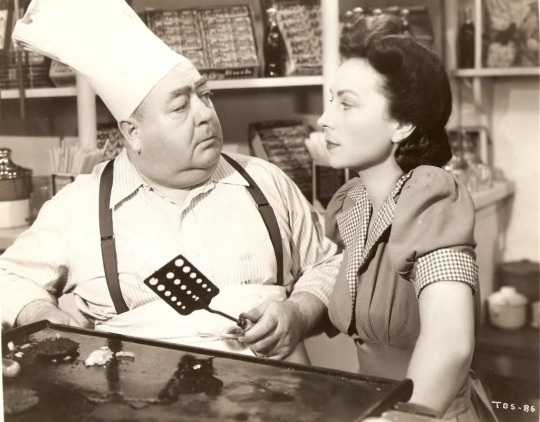
Agnes Moorehead (Violette Shumberg) was a classically trained performer who collaborated with Orson Welles on Citizen Kane (1941) and The Magnificent Ambersons (1942). She is best remembered as Samantha’s exotic mother Endora on the TV series “Bewitched” (1964-72).
Violette weighs 100 pounds, four ounces.
“She has a very large capacity for groceries.” ~ Pinks (about Violette)

Sam Levene (Horsethief) originated the role of Nathan Detroit in the Broadway stage musical of Runyon’s Guys and Dolls. Singing great Frank Sinatra played Nathan Detroit in the movie version in 1955.
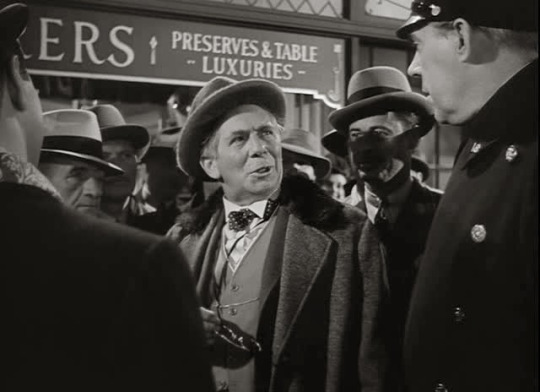
Ray Collins (Professor B) also collaborated with Orson Welles on Citizen Kane (1941) and The Magnificent Ambersons (1942), along with Agnes Moorehead. He is best remembered for playing Lieutenant Tragg on “Perry Mason” from 1957 to 1965.
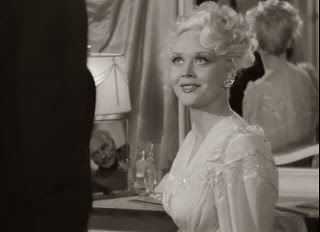
Marion Martin (Mimi Venus) would also be seen with Lucille Ball in Abbott and Costello in Hollywood (1945). Although she was often cast as a brassy stripper, showgirl or tough gun moll, off screen she was known to be extremely shy and retiring.
“That dame is a lump of mud!” ~Gloria (about Mimi)

William Orr (Decatur Reed) was an actor turned executive. As the head of WB Television for nine years, he was executive producer of the studio's early forays into the medium, helping to put ABC on the prime-time map with a steady staple of westerns and detective shows. In 1959 he received a Golden Globe for his contributions to television.
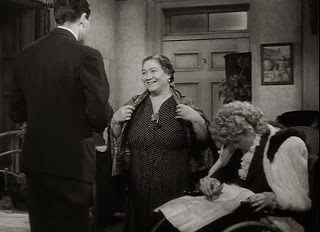
Vera Gordon (Mrs. Lefkowitz) emigrated with her family from Russia when she was seven years old. She became involved in the theatre and was active in silent films and early talkies. She had previously appeared with Lucille Ball in 1938′s Having Wonderful Time.

George Cleveland (Col. Venus) makes his fourth film appearance with Lucille Ball. In 1949 they also did Miss Grant Takes Richmond. He is best remembered for playing Gramps on “Lassie” (1954-57).

Ozzie Nelson (Himself) was considered the pre-eminent TV dad of the 1950s thanks to his successful family sitcom “The Adventures of Ozzie and Harriet” (1952-66). Before TV fame, he was a bandleader with his wife Harriet the lead singer. Nelson later appeared on several talk shows with Lucille Ball.
UNCREDITED CAST (with connections to Lucille Ball)
Baby (Gloria’s Pekingese Dog)

Louise Beavers (Ruby, Gloria’s Maid) went on to appear in three more films with Lucille Ball: DuBarry Was a Lady (1943), Lover Come Back (1946), and The Facts of Life (1960).
Charles Cane (McCarty, Holland Tunnel Policeman) also appeared with Lucille Ball in The Dark Corner (1946) and as one of the theatre patrons at “Over The Teacups” in “Ethel’s Birthday” (1954) which also featured Big Street extras Bess Flowers, James Conaty, Sam Harris, and Harold Miller.
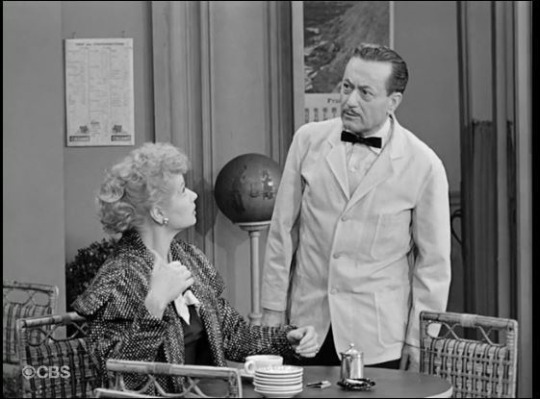
Jack Chefe was seen as a Paris waiter in “Lucy Meets Charles Boyer” (ILL S5;E19) and played a bellhop in “Lucy and John Wayne” (ILL S5;E2) and had also appeared in five films with Lucille Ball, including playing a waiter in Forever, Darling. Of Chefe’s 358 film roles, 165 were waiters!
James Conaty (Nightclub Patron) was also seen with Lucille in I Dreamed Too Much (1935), Lured (1947), and The Long Long Trailer (1953). He was one of the theatre patrons at “Over The Teacups” in “Ethel’s Birthday” (1954) which also featured Big Street extras Bess Flowers, Charles Cane, Sam Harris, and Harold Miller.
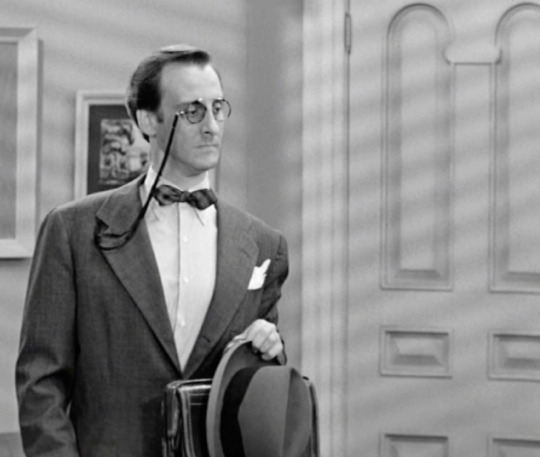
Hans Conried (Waiter) played Harry Martin in “Redecorating” (ILL S2;E8) and Percy Livermore in “Lucy Hires an English Tutor” (ILL S2;E13), both in 1952. He also did two episodes of “The Lucy Show,” both as her music tutor Dr. Gitterman in 1963.
Pedro de Cordoba (Doctor) was also seen with Lucille Ball in Five Came Back (1939).
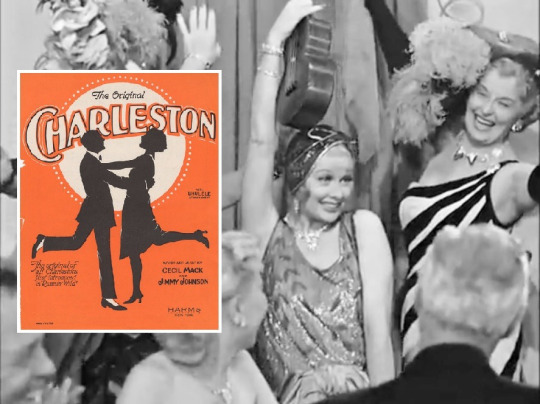
Helen Dickson (Florida Club Patron) had appeared with Lucille Ball in Carnival (1935) and Two Smart People (1946). She was one of the aging flapper showgirls in “Ricky Loses His Voice” (ILL S2;E9) in 1952.
Jimmy Dime (Truck Driver / Stunts) was seen with Lucille Ball in 1951′s The Magic Carpet. He did a half dozen episodes as a background players on Desilu’s “The Untouchables” (1959-61).
Eddie Dunn (Mulvaney) was also part of Ziegfeld Follies (1945) featuring Lucille Ball.
Jay Eaton (Late Night New York Nightclub Patron) did a total of nine films with Lucille Ball between 1934 and 1949, including her other Damon Runyon film Sorrowful Jones (1949).
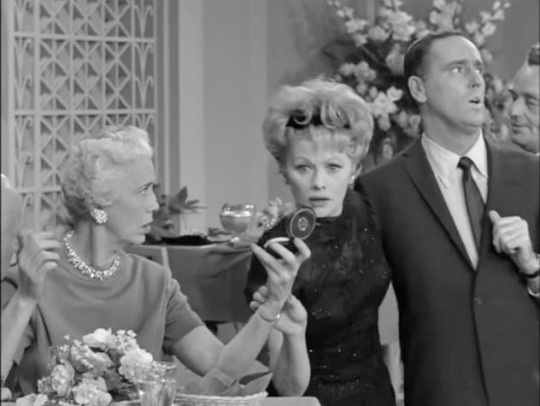
Bess Flowers (Florida Nightclub Patron) aka 'Queen of the Extras’ made numerous uncredited background appearances on both “I Love Lucy” and “The Lucy Show.” She holds the record of the most film collaborations with Lucille Ball: 17.
Karen X. Gaylord (Florida Club Patron) was also part of Ziegfeld Follies (1945) featuring Lucille Ball.
Charlie Hall (Caviar Waiter) also did Kid Millions with Lucille Ball and went on to do four more films with her until 1942.
William Halligan (Detective) was also with Lucille Ball in 1940′s You Can’t Fool Your Wife.
Art Hamburger (Joe Duffle, Eating Contest Opponent) makes his final of three screen appearances. He became an associate director. This is his only time working with Lucille Ball.
Joe Duffle is from Boston and weighs 337 and a half pounds. There is some irony that Nicely Nicely (then Violette’s) eating contest opponent is actually named Hamburger.
Mary Halsey (Showgirl) also did Seven Days Leave with Lucille Ball in 1942.
Sam Harris (Passerby on Florida Boardwalk) was in the background of a dozen Lucille Ball films, as well as being seen on “I Love Lucy,” “The Lucy-Desi Comedy Hour” and “The Lucy Show.” He was one of the theatre patrons at “Over The Teacups” in “Ethel’s Birthday” (1954) which also featured Big Street extras Bess Flowers, Charles Cane, James Conaty, and Harold Miller.
Jack Herrick (Mindy’s Customer) was also seen with Lucille Ball in The Bowery (1933).
John Indrisano (Mug at Mindy's) was also seen with Lucille Ball in The Facts of Life (1960).
Tiny Jones (Small Friendly Neighbor) was seen with Lucille Ball in A Girl, A Guy, and a Gob (1934) and Five Came Back (1939).
Donald Kerr (Pete the Passer) appeared in eight films with Lucille Ball between 1936 and 1954.
Wilbur Mack (Florida Club Patron) appeared in three more films with Lucille Ball: Thousands Cheer (1943), Ziegfeld Follies (1945), and Lured (1947).
George Magrill (Mug at Mindy's / Stunts) appeared with Lucille Ball in ten films between 1933 and 1949.
Richard Martin also did Seven Days Leave with Lucille Ball in 1942
Tony Merlo (Mug at Mindy's) was also seen with Lucille Ball in Dance, Girl, Dance (1940) and Broadway Bill (1934).
John ‘Skins’ Miller (Truck Driver) was also with Lucille Ball in Fancy Pants (1950) and Sorrowful Jones (1949).
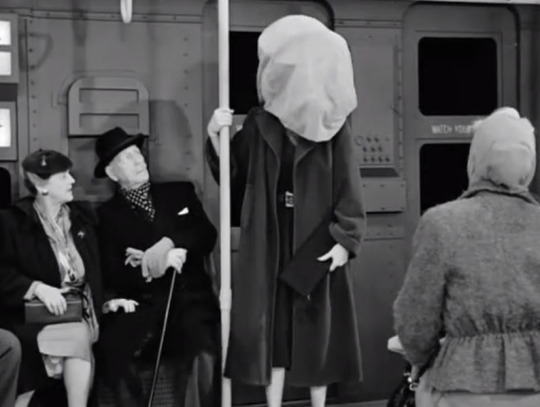
Harold Miller (Florida Club Patron) shares 13 film credits with Lucille Ball. He was one of the theatre patrons at “Over The Teacups” in “Ethel’s Birthday” (1954) which also featured Big Street extras Bess Flowers, Charles Cane, James Conaty, and Harold Miller. Harris would return for “Lucy and the Loving Cup” (S6;E12) as a subway strap hanger. He appeared in six episodes of “The Lucy Show,” the last one being as a party guest on “My Fair Lucy” (1965).
Bert Moorhouse (Florida Club Waiter) did nine films with Lucille Ball from 1933 to 1954.
Frank Moran (Mug at Mindy’s) makes his final of five film appearances with Lucille Ball.
George Noisome (Newsboy) also appeared with Lucille Ball in That’s Right, You’re Wrong (1939).
Barry Norton (Florida Club Patron) was also seen with Lucille Ball in Nana (1934) and Dance, Girl, Dance (1940).
Frank O’Connor (Police Captain at Holland Tunnel) did nine films with Lucille Ball from 1933 to 1946.
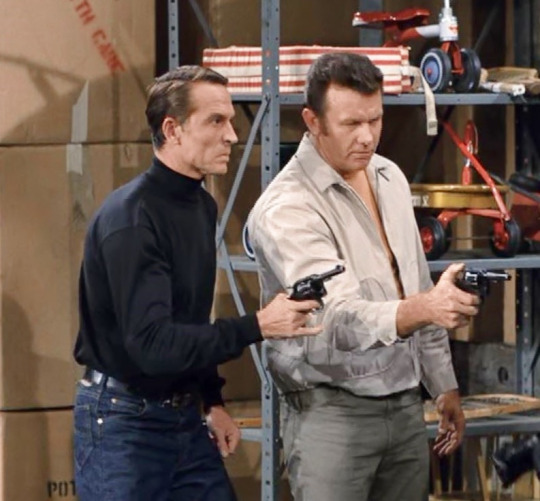
Gil Perkins (Mug / Stunts) was aboard the train when Lucy and Ricky headed home from California in “The Great Train Robbery” (ILL S5;E5). He was seen in The Fuller Brush Girl (1950) with Lucille Ball. He made one appearance on “Here’s Lucy” (above right) in 1970.
Bob Perry (Toupee, Associate of Ables / Stunts) was also seen with Lucille Ball in Stage Door (1937) and Joy of Living (1938).
Ralph Peters (Florist) was also with Lucille Ball in Sorrowful Jones (1949).
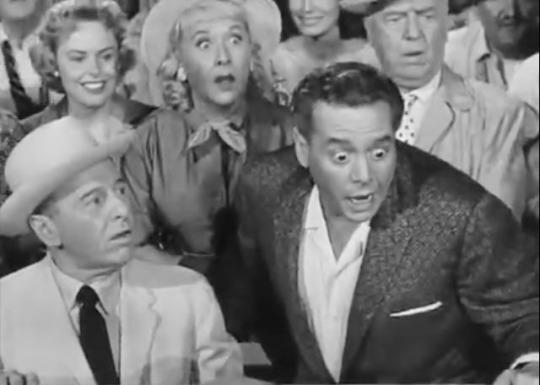
Addison Richards (Dr. Mitchell) played the American Consul in “Lucy Goes To Mexico” (LDCH 1959) as well as three other films with Lucille Ball.
Dewey Robinson (Truck Driver) did five other films with Lucille Ball.
Shimen Ruskin (Waiter Captain at Florida Club) was previously seen with Lucille Ball in Having Wonderful Time (1938) but is best remembered as Mordcha in the film Fiddler on the Roof (1971).
Hector V. Sarno (Friendly Neighbor) was also with Lucille Ball in Muss ‘em Up (1936).
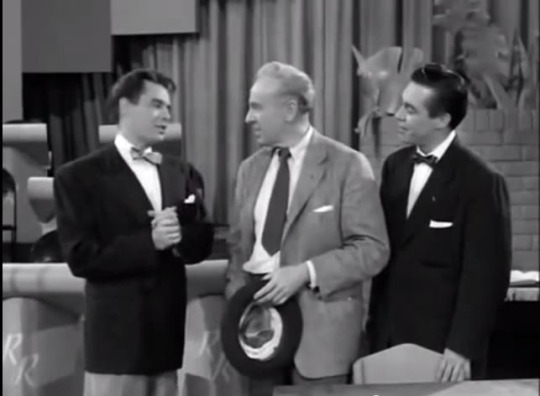
Harry Shannon (Florida Doctor) was seen with Lucille Ball and Desi Arnaz in Too Many Girls (1940). He played Jim White (above center), photographer in “Men Are Messy” (ILL S1;E8) in 1951. He is probably best remembered as the father of Rose (Rosalind Russell) in Gypsy (1962).
Walter Soderling (Doctor at Mindy’s) was with Lucille Ball in Easy To Wed (1946).
Mary Stuart (Showgirl) was also seen with Lucille Ball in Seven Days Leave (1942). She is best remembered for her four decade run as Mary on “Search for Tomorrow”.
Elliott Sullivan (Tramp) was also in That’s Right, You’re Wrong (1939) and Next Time I Marry (1938) with Lucille Ball.
Harry Wilson (Fethington) did four other films with Lucille Ball between 1934 and 1950. He was also an extra on Desilu’s “Untouchables” (1959-62).
Marie Windsor (Florida Club Patron) was also in Critic’s Choice (1963) with Lucille Ball.
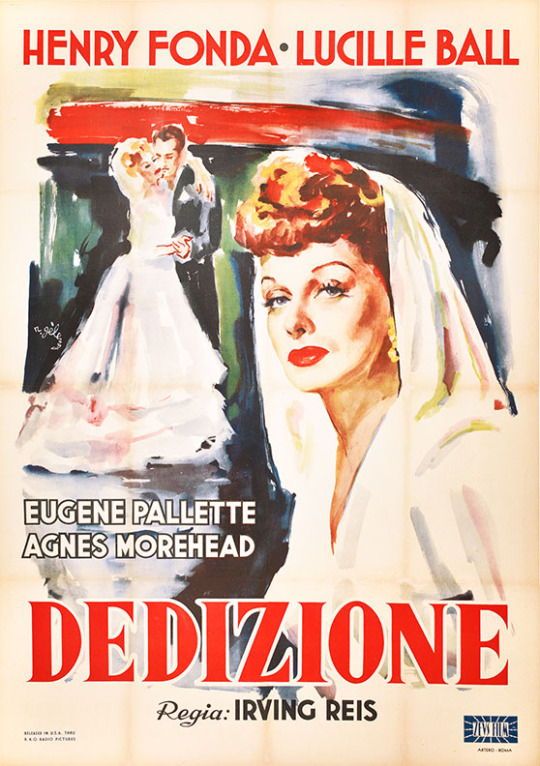
BIG STREET OPENING
"Loser's Lane - the sidewalk in front of Mindy's Restaurant on Broadway - is not as high-toned a trading center as Wall Street, but the brokers are a lot more colorful. Generally they prefer to put their money on a prizefight or horse race, but when the action slows, anything can happen and it usually does. Tonight, for example, the citizens of the Lane are discussing the latest contest in their usual quiet way..."
BIG STREET TRIVIA
The Big Street was a nickname for Broadway, where this movie's plot starts, and where all Runyon's stories take place. The film opens at West 50th and Broadway in New York City, with the marquee of the Capitol Theatre in the background.
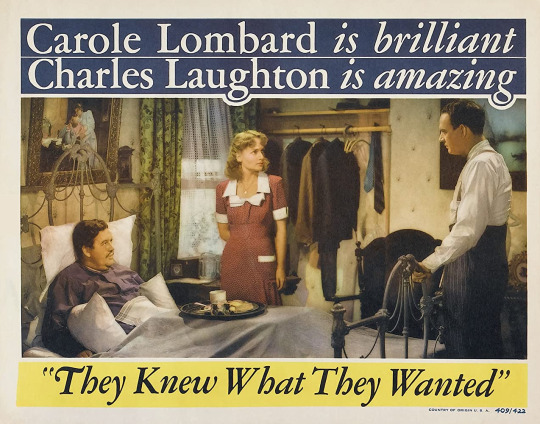
Damon Runyon originally wanted to cast Charles Laughton and Carole Lombard in the lead roles, but neither one was interested in the project. The two had previously paired on White Women (1933) and They Knew What They Wanted (1940), Lombard suggested the producer consider her friend Lucille Ball and, despite pressure by RKO to hire a better-known actress, Runyon offered her the role. Unaccustomed to playing series roles, Lucille asked advice from Laughton on how to approach such a difficult part. Laughton told her not to hold back: “If you are going to play a bitch, play a bitch!”
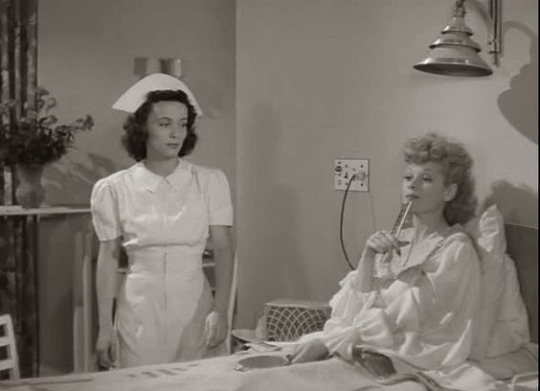
Ball later recalled that at the time she was cast, "nothing much seemed to be happening for me at the studio. My $1000 weekly paycheck came regularly, but I was still a regular among the Bs."
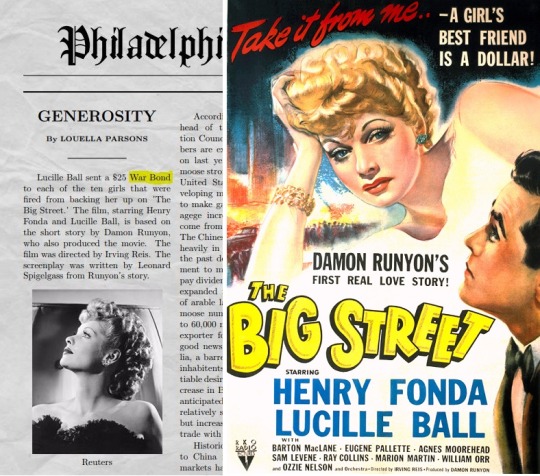
Philadelphia Daily News ~ June 6, 1942
Reports that Lucille Ball sent a $25 War Bond to each of the ten girls that were fired from backing her up on “The Big Street”.
During filming, Lucy’s new husband Desi Arnaz felt so insecure about leaving Lucy and Fonda alone together that he’d often pop by the set to keep an eye on them. His paranoia so exasperated director Irving Reis that he finally banned him from the set.
This was Lucille Ball’s favorite of her nearly 80 films. She felt her performance was unjustly ignored by the Academy.
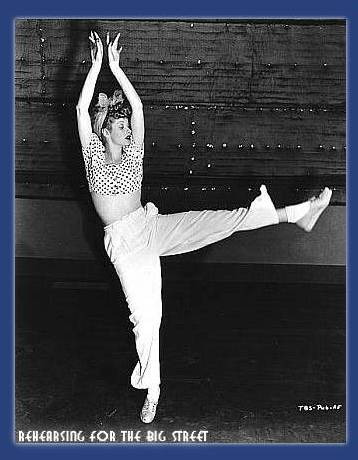
The vocals for "Who Knows?" by Harry Revel and Mort Greene, performed by Gloria in Case's Manhattan club, were provided by Martha Mears. The character later reprises the song with Ozzie Nelson and his orchestra in the Miami nightspot.
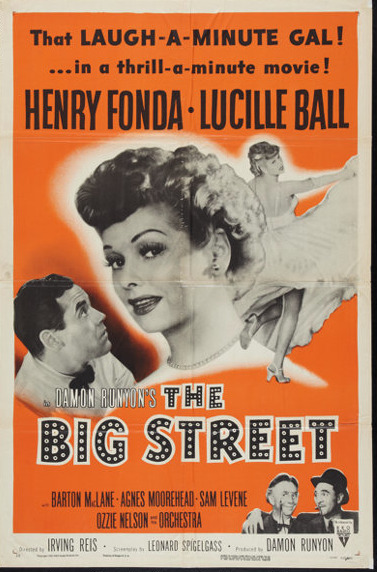
The film was re-released in 1955, at the height of Lucille Ball’s television success. Although Fonda remains first billed, Ball’s photo clearly indicates that she is the drawing card.
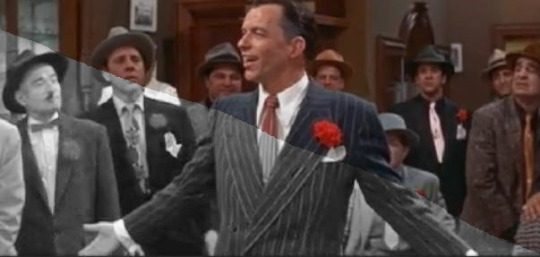
Damon Runyon also created the source material for the hit Broadway musical Guys and Dolls (1950), which starred Robert Alda, who went on to make several appearances on “The Lucy Show.” The two stories share the character of Nicely Nicely Johnson. When the film version was made by MGM in 1955, Lucy and Desi were also under contract to the studio. A brief clip of the film was inserted into the middle of an episode of “I Love Lucy” called “Lucy and the Dummy” (S5;E3), although the clip was removed after its initial airing. Further, when Lucille Ball first came to Hollywood, before becoming a contract player at RKO, she worked for Sam Goldwyn as one of the Goldwyn Girls. In Guys and Dolls, the Hot Box Girls are played by the Goldwyn Girls.
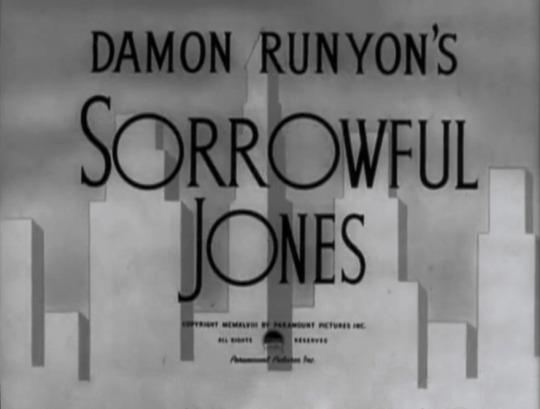
In 1949, Lucille Ball starred in another film based on a Damon Runyon story, Sorrowful Jones, a remake of the 1934 Shirley Temple film, Little Miss Marker.
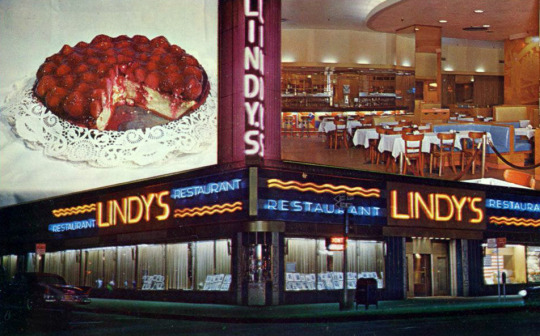
Damon Runyon was a big fan of Lindy’s, a Manhattan restaurant famous for their cheesecake, and wrote the eatery into his books as Mindy's. The musical Guys and Dolls, based on Runyon's writings, immortalizes Lindy's in one of its songs. In “Ricky’s Contract” (ILL S4;E10), Lucy tells Fred and Ethel that Ricky took his entire band to Lindy’s to celebrate learning that he had been offered a movie contract.
In The Big Street, a sympathetic Pinks decides to take Gloria to Florida to recuperate - by pushing her wheelchair the entire way - starting with the Holland Tunnel! Although Lucy and Fonda never left Hollywood, the locations are achieved by rear projection and establishing footage.
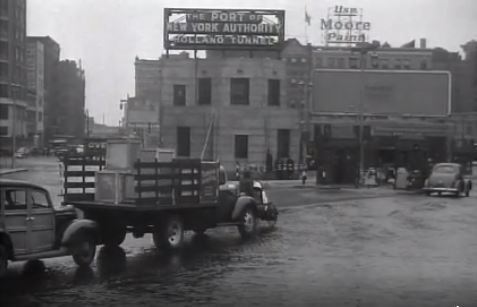
The Holland Tunnel figures into “I Love Lucy,” not once - but twice. In “The Marriage License” (ILL S ), after finding out that her marriage license may be invalid, Lucy goes on a twelve hour walk to East Orange, New Jersey. “How I ever got through the Holland Tunnel, I don’t know.”

The Holland Tunnel will be mentioned again three years later in “Lucy Learns to Drive” (ILL S4;E11). Reportedly, she tried to make a u-turn in the Holland Tunnel resulting in traffic being tied up to East Orange, New Jersey.
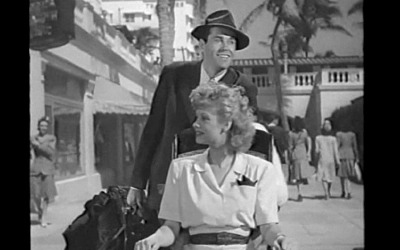
Action is also set in Miami Beach, Florida. Pinks and Gloria hitchhike there to visit with Nicely Nicely and Violette who are operating a night spot there.
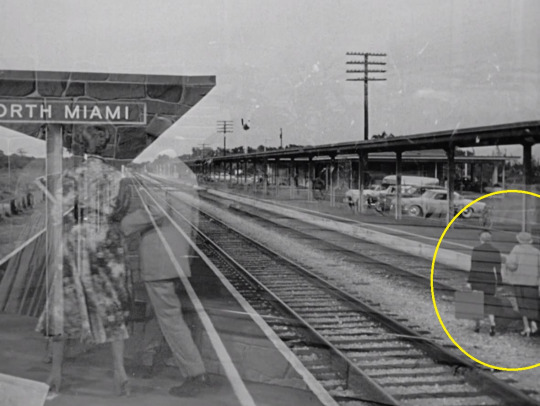
In “Off To Florida” (ILL S6;E6), Lucy and Ethel also hitchhike to Miami Beach Florida after being left on the side of the road by their ride share, a suspected hatchet murderess. They arrive at the North Miami train station covered in chicken feathers from riding in the back of a poultry truck.
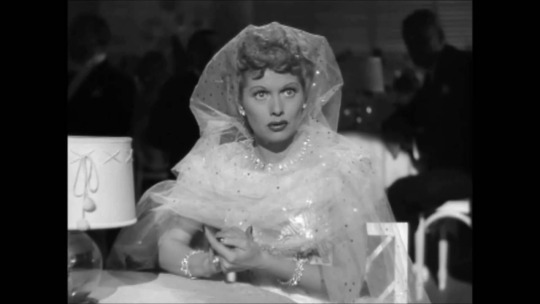
Doting Pinks has a pet name for haughty Gloria: 'Your Highness'. In Florida, her friends conspire to get people to come and hear her sing by fibbing that she is the Princess of Corolia, a fictional place.

In “The Publicity Agent” (ILL S1;E31), Lucy conspires to get Ricky more publicity by pretending to be a fawning fan of royal blood: ‘The Maharincess of Franistan’!
FAST FORWARD!
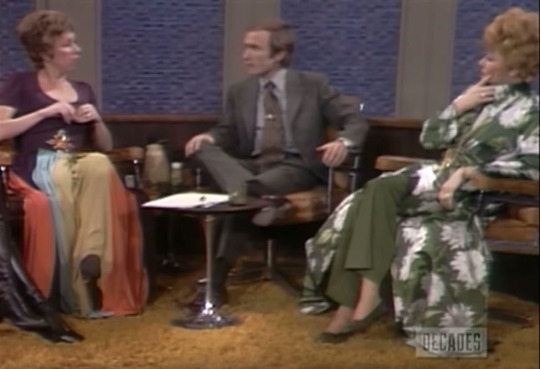
On a 1971 episode of “The Dick Cavett Show" with guests Lucille Ball, Carol Burnett, and Lucie Arnaz, Lucie compliments her mother's dramatic performance in the film.
The film is referenced in the television film Lucy & Desi: Before the Laughter (1991)
A poster for the film is on Lucy’s dressing room wall in Lucy, a 2003 TV movie.
The Big Street turns up in the TV listings in the low budget film Hollywood Mouth (2008) starring Joe Bologna.
A clip from the film is featured in a montage during “AFI Life Achievement Award: A Tribute to Henry Fonda” a 1978 special attended by Lucille Ball.
Henry Fonda: The Man and His Movies (1982) contains dressing room and dance floor scenes with Lucille Ball.
The Emmy-winning documentary Lucy and Desi: A Home Movie (1993) features a brief clip from the movie.
When Cher is TCM Guest Programmer in 2011, she selects The Big Street as one of her films to be aired.
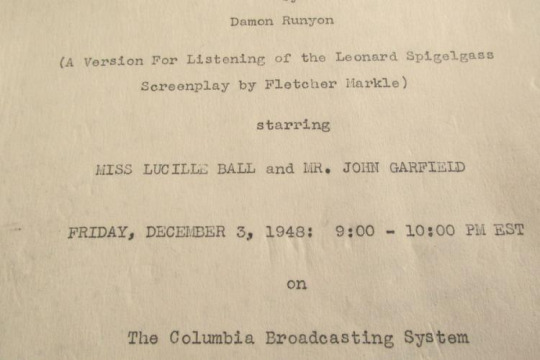
In December 1948, Lucille Ball reprised her role on radio with John Garfield taking the role of Pinks.
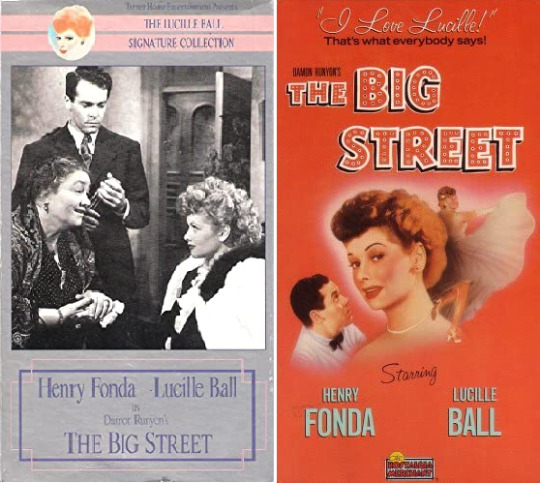
The Big Street on VHS.
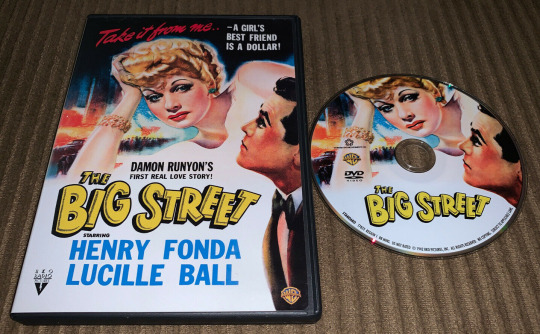
The Big Street is available on DVD from Warner Home Video. It is also part of the Lucille Ball Collection DVD, which also includes Dance, Girl, Dance, DuBarry Was A Lady, Critic’s Choice, and Mame.
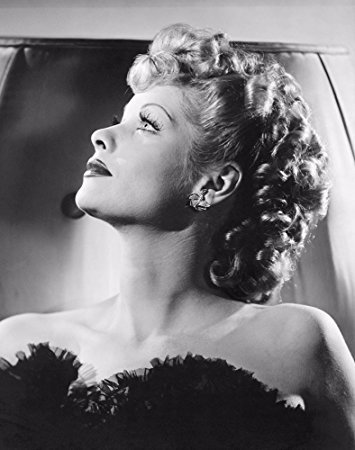
14 notes
·
View notes
Note
Do you have any songs you associate with your ocs? (plus also Cave and/or Caroline!)
i have .. a lot of songs that i associate with my ocs and cave and caroline. and i have a lot of ocs... so i’ll just put a few here as to not be overwhelming
greg - arsonist’s lullaby by hozier, a sadness runs through him by the hoosiers, weird science by oingo boingo
derek - little fang by avey tare’s slasher flicks, upside down by jack johnson, mowgli’s road by marina and the diamonds, and make the grade by jack conte
sunny - reaper man by mother mother, houmous by igorrr, and the outsider by a perfect circle
cave - how big can you get by cab calloway, man made object by lemon demon, the singularity by dr steel, and lament for a toy factory by dr steel
caroline - i am not a robot by marina and the diamonds, and gasoline by halsey
cave and caroline - matilda by alt j, give ‘em hell, kid by my chemical romance, and putting the dog to sleep by the antlers (as well as some other songs by the antlers especially from the hospice album)
7 notes
·
View notes